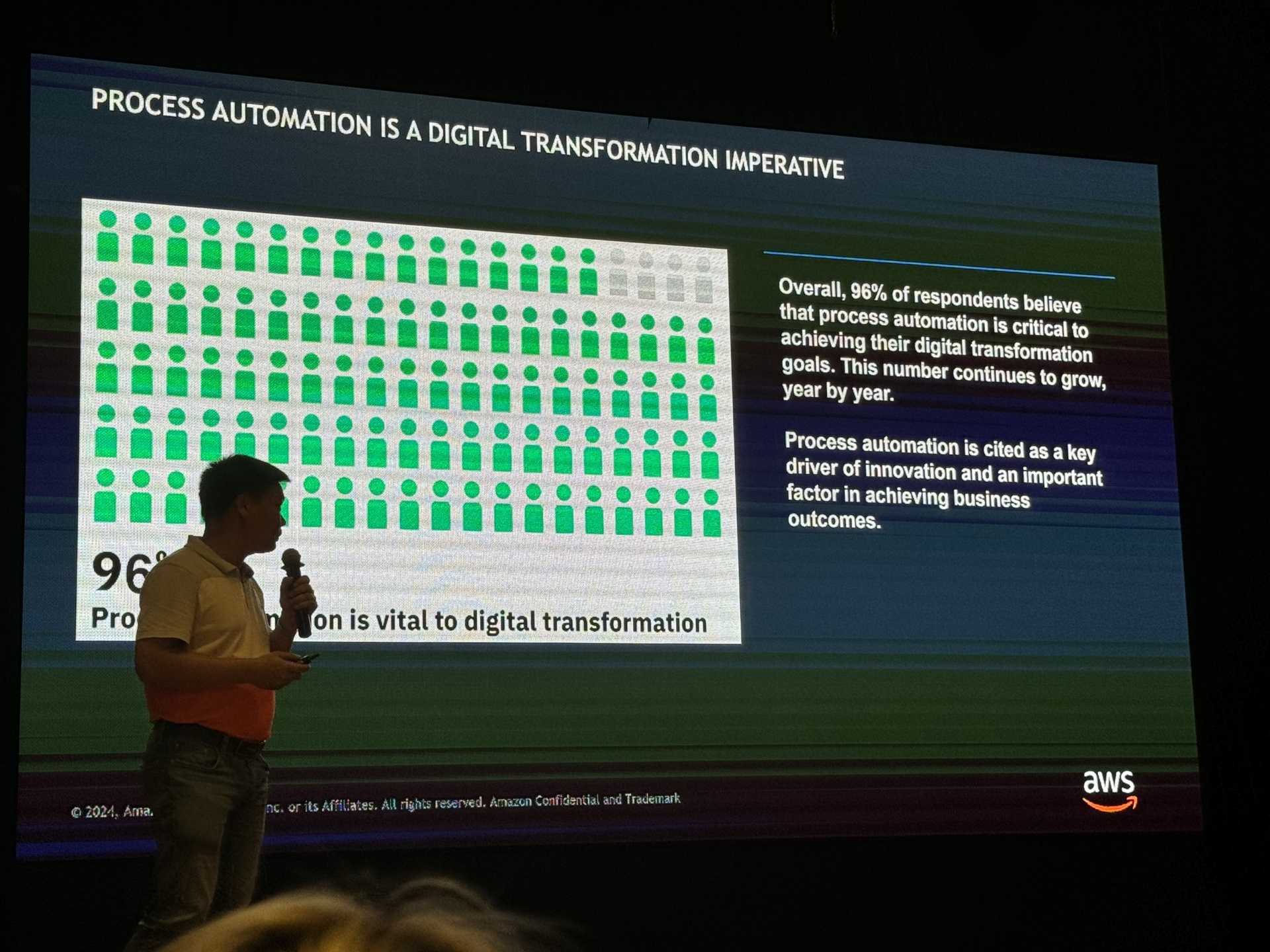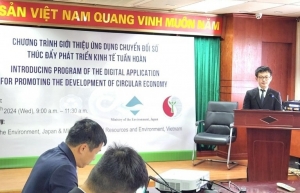Assessing the role of business process automation
BPA is a trend that leverages technology to automate activities and functional processes within a business. The goal of BPA is to enhance operational efficiency, minimise errors, standardise processes, and enable employees to focus on strategic, value-added activities.
 |
Nguyen Hong Nhung, director of Vietnam Expo 2024 said, “The wave of automation technology is a key factor in helping businesses develop and enhance their competitiveness. New technologies such as robotic process automation, intelligent document processing, and AI will have a direct impact on certain industries, affecting input productivity and spreading to other sectors through market mechanisms.”
Nhung added that the level of automation adoption among Vietnamese businesses is still relatively low, presenting an opportunity for automation solution providers to introduce their products while also posing a challenge for businesses to adapt in the era of the rapidly developing digital economy.
According to Nguyen Quang Thong, deputy director of retail banking and director of the digital banking centre at Nam A Bank, automation is not only a tool to enhance work efficiency, but also a means to optimise the customer experience with personalised banking services.
“In the context of the strong digital transformation happening in Vietnam, automation has become not just an option but a necessary requirement for every bank. Automation helps the banking industry improve response time, accuracy, and security in every transaction,” Thong said.
Nam A Bank embraced digital transformation from very early and currently owns ONEBANK, a digital banking ecosystem with automation technology that allows people to access and experience financial services 24/7, including on festive occasions and holidays, at competitive costs.
The application of BPA in operations helps factories increase efficiency and achieve environmental, social, and governance (ESG) benefits such as reducing carbon emissions, creating a secure working environment, promoting innovation, reducing errors in processes, and optimising operational costs of assets, processes, and resources.
 |
For small- and medium-sized enterprises (SMEs), BPA presents an opportunity to expand their access to the global market.
Do Dang Khoa, CMO at CNV Loyalty, a unit providing customer care solutions, noted that the flexibility of SMEs was an apparent advantage in the digital transformation process.
With a pool of experience in providing solutions to SMEs, Khoa underlined the need for businesses to first set the goals to measure and evaluate efficiency when embracing conversion, then considering costs and budget. The next factor to consider is time because not all businesses can afford to carry out digital transformation over a long period of time.
“There are businesses that need to transform quickly, so choosing the right unit and solution is critical,” said Khoa.
According to prime ministerial Decision No.130/QD-TTg on the National High-Tech Development Programme to 2030, about 20 technologies in the field of automation are enshrined in the wish-list of 99 high-technologies given top priority for investment and development by the Prime Minister, while the list of more than 100 high-tech products encouraged for investment and development features about 30 products in automation.
Lawyer Nguyen Thi Thuy Chung from Hanoi-based full-service ASL Law said that the government has developed diverse policies to support businesses in digital transformation, including policies on tax incentives and sci-tech research, policies on technology transfer from abroad into Vietnam, and policies to help bolster competitiveness.
“Leveraging the government's supportive policies, Vietnamese businesses will directly garner the values from technology transfer. Besides this, freed from manual work, labourers could raise their income and improve skills thanks to the automation wave,” Chung said.
According to Pham Ngoc Son, chairman of the Board of Directors of FaceNet Software Services and High Technology JSC, automation has opened a new era in the management and deployment of IT systems.
At FaceNet, automation helps businesses operate more efficiently and significantly improves end-user experience.
“With its quick and flexible deployment capabilities, automation has become the key to unlocking unlimited creative potential, enabling organisations of all scales to adapt and thrive in the digital world,” Son said.
According to GlobeNewsWire, the BPA market is estimated to be worth around $14.2 billion, with an expected increase to $30.2 billion by the end of 2030, and a compound annual growth rate of 11.4 per cent.
Not only limited to optimising productivity, BPA also promises to drive global commerce through applications such as smart warehouses, shipment tracking robots, order management, digital software that accelerates commercial transactions by streamlining paperwork and payments, and data analytics tools that help organisations identify trends, make accurate forecasts, and optimise supply chains.
The BPA solutions seminar was jointly organised by Vinexad National Trade Fair and Advertising JSC and WorldBaseSys (WBS) Co., Ltd. WBS specialises in providing digital solutions based on a comprehensive management application platform.
 | IBM: Five top trends for 2024 to enhance Vietnam's digital economy Designing around AI, AI usage, data conversation, operating models, and ecosystem building will be the five main tech trends in 2024, IBM Vietnam pointed out at a press conference on December 12. |
 | Digital transformation to drive circular economy A programme focussing on digital applications for visualising material cycles and resource efficiency and their role in advancing the circular economy in Vietnam was held on January 24 in Hanoi. It was led by the Resource and Environment Communication Center (RECC) in partnership with Japan's Environmental Renewal and Material Circulation Bureau. |
 | Vietnam embracing digital economy From 2024, Vietnam will officially measure the added value proportion of the digital economy on the country’s GDP. Nguyen Thi Huong, director general of General Statistics Office (GSO) under the Ministry of Planning and Investment, spoke with VIR's Manh Bon about the country's current digital economy. |
What the stars mean:
★ Poor ★ ★ Promising ★★★ Good ★★★★ Very good ★★★★★ Exceptional
 Tag:
Tag:
Related Contents
Latest News
More News
- The PAN Group acquires $56 million in after-tax profit in 2025 (February 03, 2026 | 13:06)
- Young entrepreneurs community to accelerate admin reform (February 03, 2026 | 13:04)
- Spring Fair 2026 launches national fair series (January 30, 2026 | 16:17)
- SnP celebrates 10th anniversary with new brand identity (January 30, 2026 | 14:41)
- Sci-tech sector sees January revenue growth of 23 per cent (January 30, 2026 | 11:20)
- Vietnam–Singapore partnership strengthens board leadership (January 30, 2026 | 11:02)
- DIGI-TEXX expands footprint with new hub in Ho Chi Minh City (January 30, 2026 | 09:04)
- Vietnamese spend $2.1 billion on food delivery apps in 2025 (January 29, 2026 | 15:14)
- Japan's NTT DATA signs agreement with CMC Global (January 29, 2026 | 15:03)
- Japfa Vietnam hosts annual customer conference (January 29, 2026 | 12:07)




























 Mobile Version
Mobile Version